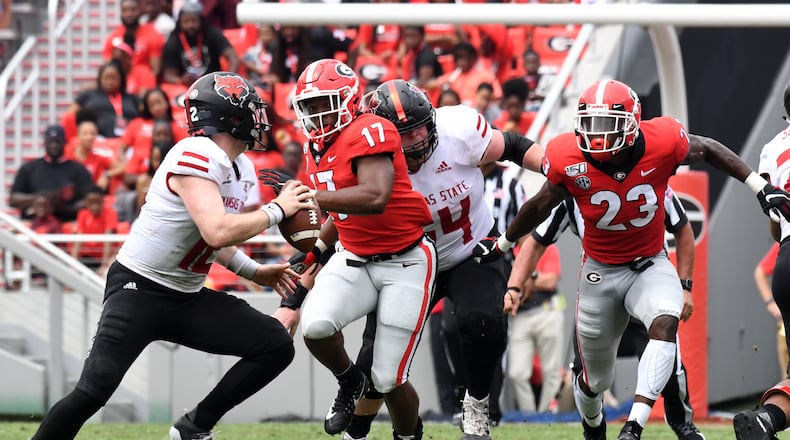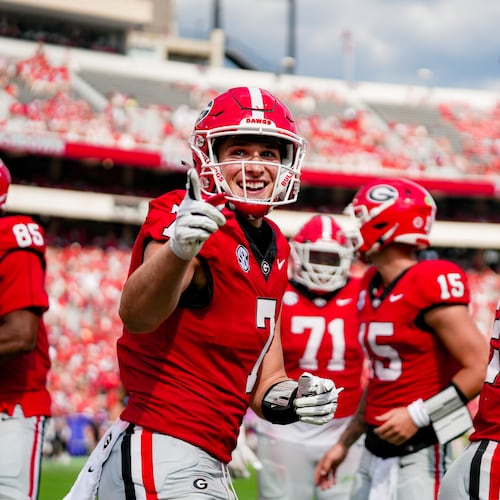When Nakobe Dean was being recruited to Georgia, he met all sorts of important people.
There was Kirby Smart, of course, the Bulldogs’ head coach. And there was linebackers coach Glenn Schumann, who would be his position coach. There were also all the other linebackers on Georgia’s team, as well as defensive coordinator Dan Lanning, sports-medicine director Ron Courson and strength-and-conditioning director Scott Sinclair.
But the most important meeting for Dean, which clinched it for the nation’s top-rated linebacker prospect, was with Prof. David Gattie.
Gattie teaches in UGA’s College of Engineering. Above all else, Dean wants to be an engineer.
Whether he would sign with the Bulldogs hinged on how that initial meeting with Gattie went during Dean's official visit.
Gattie remembers it well.
“I met with him and his mama,” Gattie recalled recently. “Mostly with his mama (Neketta Dean), because she was deadly serious about his academics. She was the way you’d expect a mother to be: She had expectations not only for Nakobe, but for all of us.”
Gattie remembered Dean excusing himself from the meeting.
“He had brought his computer,” Gattie said. “He said he was working on an English paper, I think it was. We were in a meeting for a while, and he said he had this paper due and he just left. He got it submitted, I guess, then came back.”
Gattie is used to dealing with such committed students. As good as Dean is as a football player, he might be a even better in the academic arena. Dean never made a B at Horn Lake High School. With extra credit for accelerated and joint-enrollment classes factored in, Dean graduated with a 4.3 grade-point average.
Dean could go to college anywhere he wanted.
So, as important as it was to find a football team Dean could play for, it was even more important to him and his mother that he find the right academic fit. With aspirations of becoming an engineer one day, being able to provide that education was the most important component.
Enter Gattie.
Gattie is the engineering school’s liaison to UGA’s athletic department. It’s not an official title but, more often than not, it is with Gattie that prospects for athletic grants-in-aid meet while they are being recruited by the Bulldogs. It’s his job to let them know that Georgia not only has an engineering school, but an exceptionally good one at that.
“We’ve got football players in the program and a lot of other athletes over here that go through the engineering program,” Gattie said. “We graduated a couple of years ago our first softball player (Samantha LaZear) with an undergraduate degree in biological engineering, and she went on to get her masters in engineering. We had a soccer player graduate not long ago.”
Move over Georgia Tech
Most tend to think of that institute in midtown Atlanta as the place where one must go to pursue an education in engineering. To be sure, Georgia Tech represents the best of the best in the field. It consistently ranks among the country’s top-10 engineering institutions and has a global reputation for producing great engineers. Most recently, its undergraduate program was ranked No. 4 by U.S. News & World Report.
You’ll not hear UGA making any bold pronouncements about overtaking Georgia Tech as an engineering school. But the Bulldogs are competitive about it and speak with pride about their ascending presence in the world of engineering education and about putting graduates to work as engineers.
“The brands are different, that’s all,” Gattie said. “Our engineers compete with their engineers for jobs. Our graduating engineers go out and enter the workforce. Our emphasis right now is in our undergraduate program. We’re growing the graduate program, but we’ve always been focused on getting our students graduated and to work.”
Currently, UGA's engineering school claims 2,414 students who are pursuing degrees in 15 undergraduate and graduate programs, all of which are fully accredited.
The college's website claims an average starting salary of $62,200 for its graduates, the highest of any major. And they're having no problems finding employment. UGA said 96 percent of its 2018 graduates either landed a job or entered graduate school. Among the companies hiring them were Apple, AT&T, Microsoft, Lockheed-Martin, AT&T, Verizon, G.E. Power, Honda, Georgia Power and Southern Company.
“Tech can’t out-brag us on any of that,” Gattie said. “Our students graduate right into the workforce. Tech’s focus is more on graduate programs, research, maybe getting back into academics. They do what they do well and we do what we do well.”
It’s not as though Georgia just got in the game. UGA has long produced engineers. In fact, engineering is one of the university’s oldest academic disciplines. It first offered classes in engineering in 1844 and produced UGA’s first engineering graduates in 1868.
The focus was primarily on civil engineering and later agricultural engineering. Until fairly recently, the programs were offered in what is now the College of Agricultural and Environmental Sciences. In 1993, biological engineering was added.
It wasn’t until 2012 that UGA jumped in with both feet to make engineering a truly interdisciplinary undergraduate program. Since then, the university has been pouring money into its College of Engineering.
Earlier this month, the school held a ribbon-cutting ceremony to dedicate a new $5.5 million laboratory and office space. That was the first of a multi-phase renovation of the Driftmier Engineering Center, a 1960s building on South Campus.
Part of recruiting game
Tight end Jackson Harris was one of the Bulldogs’ first football players to graduate from the new engineering school.
“I’m not going to lie; it’s hard,” said Harris, who graduated with a degree in mechanical engineering last spring. “You have to have great time management, you have to sacrifice things and you’ve got to make it a priority.”
The 6-foot-6, 247-pound Harris was a consensus 4-star prospect when he was being recruited out of Columbia (Tenn.) High School. Naturally, he was vigorously pursued by the University of Tennessee, which is known for its engineering school.
Harris said he would not have signed with the Bulldogs had they not been able to offer something similar.
“I’ve always known I wanted to be in engineering so, absolutely, if there wasn’t an engineering school here, I never would have considered Georgia,” said Harris, who was waived by the Seattle Seahawks after their last roster cut in late August. “That played a big role in my decision. That was the first thing I looked at with all the schools. I wanted to make sure they had my degree.”
That was big for Dean as well, and also for Nolan Smith.
Like Dean, the 6-3, 225-pound outside linebacker was ranked the No. 1 player in the nation at his position. Smith and Dean both signed in Georgia’s 2019 class, which ended up ranked No. 2 in the country, according to 247Sports.
So, when coaches say academics matter when they’re recruiting, they’re not kidding.
“I'm thinking about studying chemical engineering,” the 5-star prospect Smith said during his recruitment. “Academics are a major thing to me.”
Of course, getting into the College of Engineering is just the beginning. Next comes the associated academic rigor.
While Georgia football players are all studying something in college, they are all majoring in football. To a man, they all hope to one day play in the NFL.
To do both requires discipline and organization.
“It's hard for me to talk about the rigors because I was a P.E. major, so was a little bit different for me,” cracked Lanning, who recruited both players to Georgia. “But Nakobe is an engineering student and so is Nolan, as well as a few other guys on our team. They take their academics extremely serious. … Georgia’s a great academic school, so when you come here you have to perform not only on the field but in the classroom and that's what we ask our guys to do.”
Gattie and his engineering colleagues are well aware of the time demands that are placed on the student-athletes that end up in their college. He has gotten to know most of them personally through the recruiting process.
“If any of them need any advice or anything, my door is always open,” Gattie said. “Football is actually relatively easy to work with. Their practice schedule is fixed, they don’t play games during the week and they practice late in the afternoon. We can work with that. Now something like softball or baseball, man, it seems like they’re playing games every day of the week. … But that’s one of the good things about our school. We’re smaller, a little more accessible.”
Dean’s experience hasn't come without trials and tribulations. In addition to taking on the demanding academic load that comes with engineering while also learning the Bulldogs' complex playbook, he has encountered the physical demands of football. Dean battled an ankle injury for the last half of preseason camp and it's affecting him still. But he has managed to play in all four of Georgia's games and heads to Tennessee on Saturday with three tackles, a tackle for loss, a pass break-up and a quarterback hurry to his credit.
Academically, it's actually going smoother now than it was last spring for Dean. An early enrollee in his first semester of college, Dean was struggling to balance the demands on his time and his perfectionism as a student.
“He was stressed beyond all measure because had a B in a class, and he’s never made a B before,” Brad Boyette, Dean's high school coach said with a laugh. “They said his professor was getting two or three emails a week, worrying him to death. ... My wife told him, ‘Nakobe, just relax and do your best. B’s are OK sometimes.’”
Especially when they come in engineering.
About the Author
Keep Reading
The Latest
Featured


